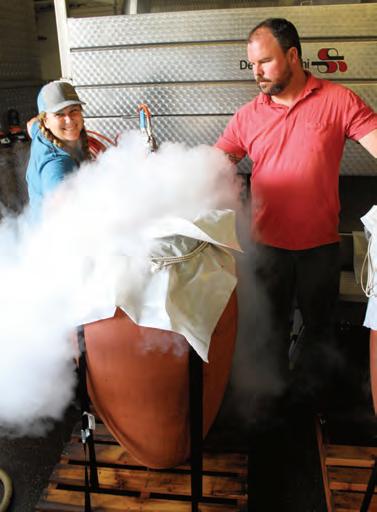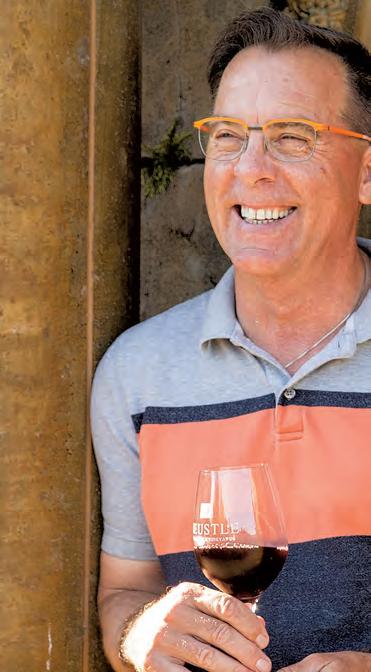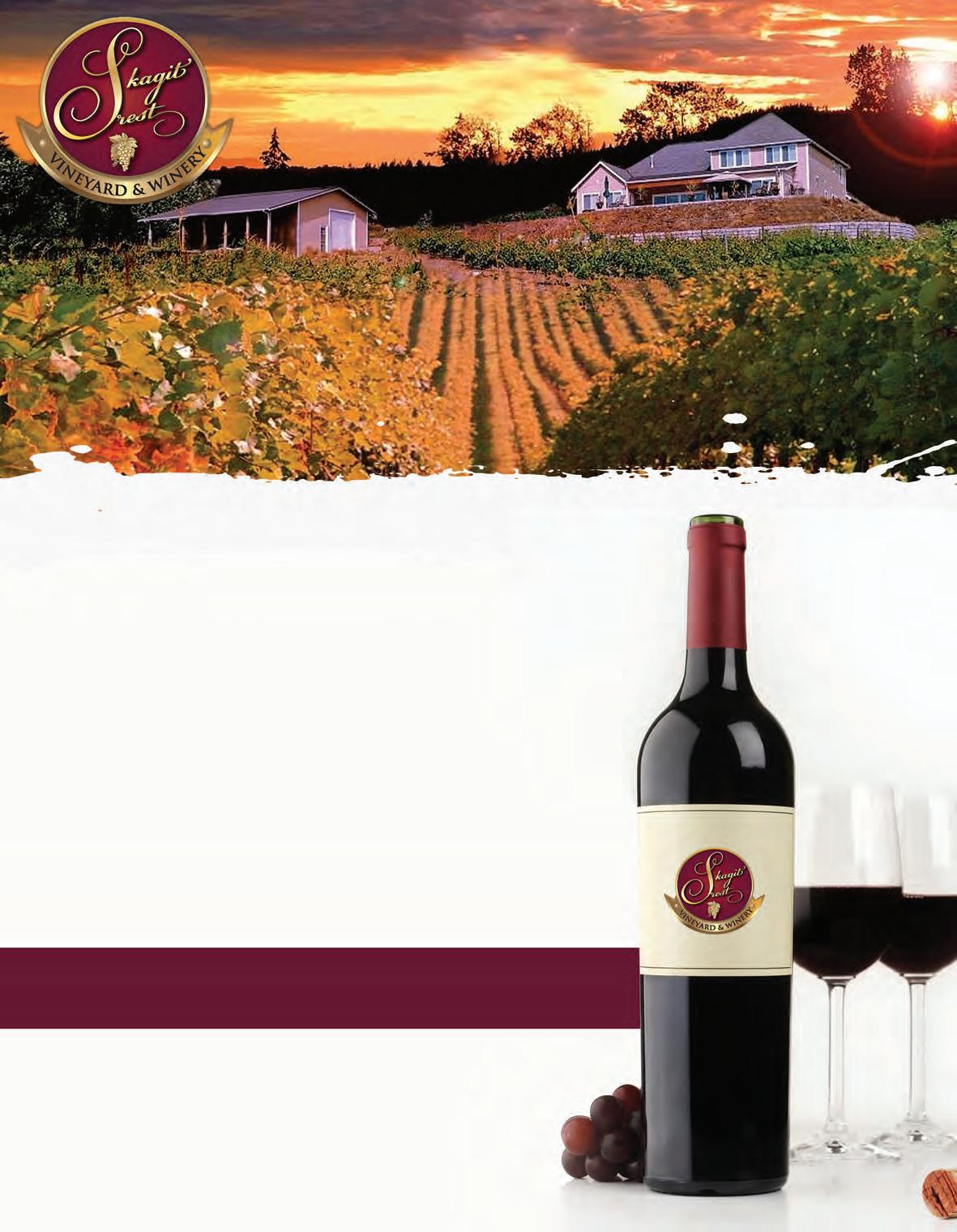
4 minute read
Limited Addition Wines
Franc, consisting of two California clones that create flavors of blue fruit and olive, and one Loire clone, which brings raspberry to the mix. They use whole cluster fermentation on their Cab Franc. Since this fruit ripens later at the end of the season, the stems are ripened and brown, which bolsters the tannin profile, adding a nice sandalwood flavor without any green notes.
Chad also uses just about every type of aging vessel imaginable: different woods, including French and Austrian oak, chestnut and acacia; different sizes of fermenters, including the first Chablis barrels; different materials, from stainless vessels and concrete eggs to clay amphorae. Everything is chosen to take advantage of lees and oxygen to maximize flavors and textures.
Advertisement
They say climate, social contracts and economic issues are driving farming changes in the Willamette Valley. The Stocks are seeking a business model that uses both what works and what will be best for the environment, considering things like diversity, sustainability, yield and ways to sustain farmers and harvest crews.
“Focusing on monoculture grapes creates a bottleneck economy for labor,” Bree says. Just looking at harvest, since Pinot Noir all ripens around the same time, it puts a strain on picking crews and migrant workers to harvest the grapes all at roughly the same time.
But planting grapes like Cabernet Franc, Grenache and Mencia, which ripen at different times, creates year-long vineyard work and sustainable communities. And grapes like Chenin Blanc crop twice as much as Chardonnay, so harvest crews can make considerably more money since their pay is typically determined by how much fruit they pick.
David Hill, with different grape varieties that all ripen at different times, has a sevenweek-long harvest season, beginning in September and continuing through the end of October, providing salaried positions with healthcare benefits, creating a more ethically equitable environment, one reason David Hill Vineyards became a certified B Corp, one of only seven wineries in Oregon.
Chad is drawn to sites offer both a sense of history and innovation. Eola Springs Vineyard, planted in 1972 by Carl Stevens in the throat of the Van Duzer Corridor, is historic

Photo by Limited Addition
Chad and Bree Stock add dry ice to an amphora of Trousseau Noir from Eola Springs Vineyard in the Eola-Amity AVA to protect the grapes from oxygen before they start wild yeast fermentation; a process calling snowing.

and the first Mencia planting in the Willamette Valley. The same is true of David Hill. “It’s a place that can intellectually and creatively sustain me, where I can be a part of the history and also a part of the innovation and the future.”
David Hill Winery and Vineyard was originally planted by wine pioneer Charles Coury in the 1960s. The Coury Nursery has been there from the beginning, originally a partnership between Dick Erath and Charles Coury. “David Hill is like a museum to Oregon’s wine country.”
There are roughly 17 different varieties of grapes planted there, though not everything is confirmed, including vines that appears to be a red-skinned Melon de Bourgogne. They currently have identified 11 distinct variety wines and are working to protect the vineyard’s diversity.
David Hill is in its third wave of development, adding new grape varieties, some already established in Oregon and some that aren’t. Mike Keunz, managing partner at David Hill, says they are doubling down planting more of the Coury vines and also introducing heirloom and new varieties.
Chad’s passion at David Hill has been creating the Discovery series, made of wines crafted from small plots of the Coury selections — including Sylvaner, Melon de Bourgogne, Chasselas, Pinot Blanc, Savignin, and Riesling. The Discovery Flight is also about technique, including the first orange wine produced by David Hill.
“The program not only works against the fatigue the public may be experiencing with grapes like Pinot Noir, it works because the American consumer is maturing,” Chad says.
Chad and Bree took a leap of faith launching Ltd+ just as COVID-19 emerged. And while some might think a pandemic would sink a new business, they have pivoted their business model to promote an online presence and have expanded.
They sold out of their Pinot Noir/Pinot Gris co-fermentation in the first months of release and are selling out of many others.
The wildfires of 2020 prompted the Stocks to rethink things even more with the high levels of smoke in vineyards. They decided against working with Pinot Noir this vintage, which led to their Trousseau/Gamay Noir blend.
“If we didn’t have diversity of grapes, and only produced Pinot Noir from the few estates we work with, this vintage could have killed us,” Chad says.
With their expanded 2020 vintage, they’re working with Gamay Noir, Garganega, Chenin Blanc, Sauvignon Blanc, Chardonnay, Grenache, Gruner Veltliner, Mencia, Trousseau and a Muscat/Pinot Gris co-fermentation. They’ve also added a Blaufränkisch (AKA Lemberger) and St. Laurent co-ferment, a dark colored, later-ripening red in its first vintage from their Chehalem Mountain Vineyard site.
Limited Addition wines are produced at David Hill Vineyard and Winery, where Chad is winemaker. Chad and Bree source the grapes for Ltd+ from Eola Springs Vineyard and Chehalem Mountain Vineyard owned by Judy Jordan. The wines are available online at https://www.limitedadditionwines.com/ and select retail stores.
TAMARA BELGARD is a freelance writer based in Portland, Ore. She is a regular contributor to www.satiatepdx.com and several northwest publications.
360-333-9819





